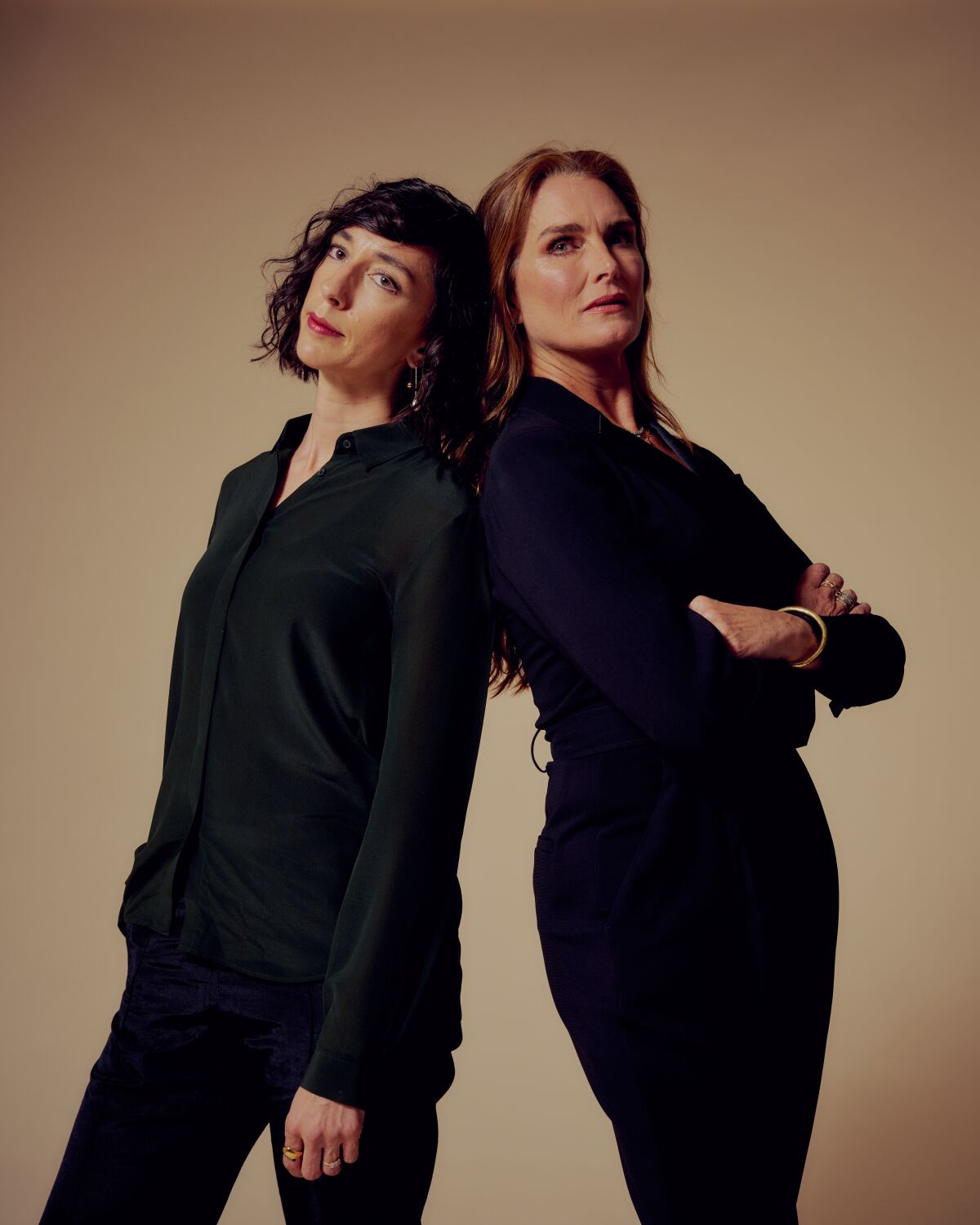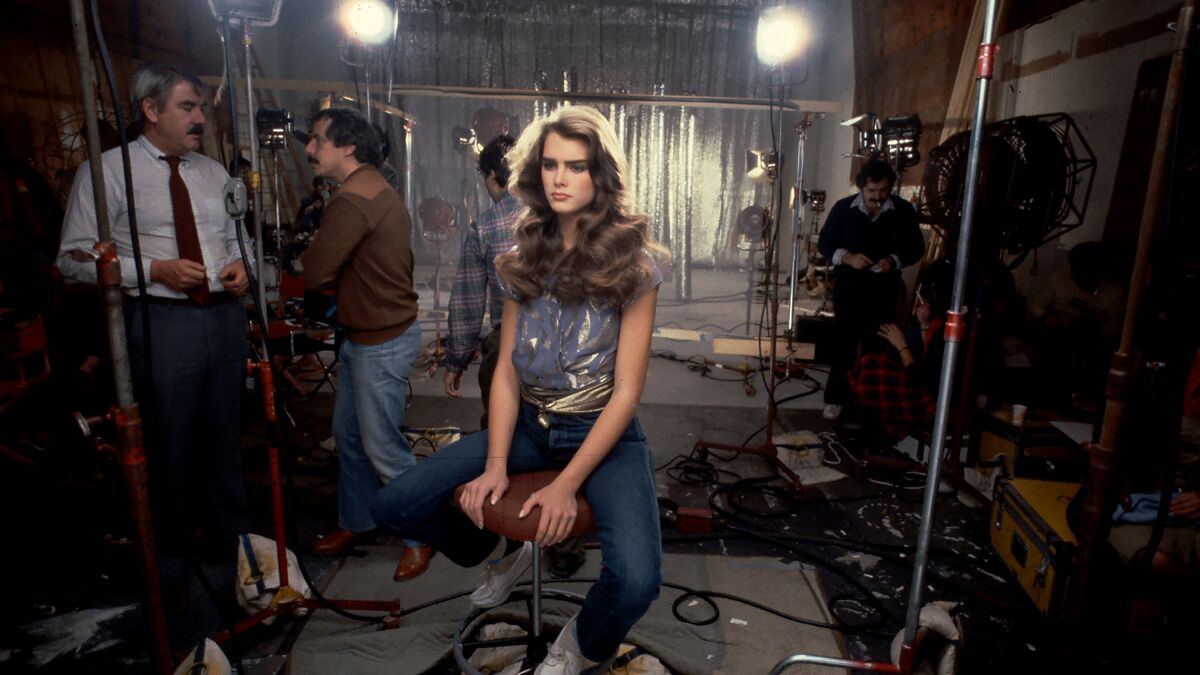How Brooke Shields bears witness to the life of … Brooke Shields

“My whole goal was just to be a witness to my own story,” says Brooke Shields, right, of Hulu documentary “Pretty Baby: Brooke Shields,” directed by Lana Wilson, left.
(Evelyn Freja / For The Times)
Brooke Shields never considered taking an executive producer credit on her two-part Hulu documentary, “Pretty Baby: Brooke Shields,” in order to seize creative control. She trusted her dear friends, married executive producers Ali Wentworth and George Stephanopoulos, and believed in News & Documentary Emmy-winning director Lana Wilson (2020’s Taylor Swift doc “Miss Americana”).
“There’s something so disingenuous about my having my hand in any of it,” Shields says over Zoom from the Manhattan home she shares with husband Chris Henchy. “I didn’t want to start projecting onto it and trying to make it something my ego wanted. My whole goal was just to be a witness to my own story.”
Shields therefore released a voluminous digital archive compiled over decades by the model-turned-actor’s lightning rod of a single mother and manager, Teri Shields. The treasure trove included more than 1,000 stills and videos, including footage from “Look at Brooke,” a never-completed documentary once commissioned by Teri.

A young Brooke Shields on set, as seen in the documentary “Pretty Baby: Brooke Shields.”
(Sundance Institute)
“What I was looking for was, what is this about other than a biopic,” Wilson says during the same interview, albeit from a different New York City location. “This is really rich and layered, and there could be a way of telling Brooke’s story but also telling this much bigger cultural story, and asking questions about how far we’ve come and what has changed, and what has not changed.”
The resultant film certainly is an indictment of how our misogynist culture has historically sexualized, objectified and exploited women and young girls — and still does. It’s also a compendium of the ill treatment inflicted upon mother and daughter by the media and by society, making it a poignant homage to the deep bond the two shared.
I ask Shields why her late mom, whose alcoholism had become an open secret, so often placed herself in harm’s way by doing joint on-camera interviews with her. “She didn’t trust that I would be handled well,” she replies. “And I wasn’t. But just her very presence was threatening to people.”
Often not threatening enough. One example, from the doc: An interviewer sits between the pair and reads a magazine description of Teri: “Her face bears the marks of the heavy drinker. The drained look. The rough skin. The sunken eyes.” He then asks Brooke, “Is that a fair description of your mother, as you know her?” All the poor child can muster in defense of silent Teri is to say, “She has terrible allergies.”
Despite the persecution, the pair never pondered putting an end to them by kissing off show business. “She wasn’t gonna let them break her. … What it was doing to her inside, I don’t know,” Shields says.

Undeterred, Teri kept courting controversy by placing her underage daughter at the heart of such sexually suggestive vehicles as “Pretty Baby,” “The Blue Lagoon” and “Endless Love.” “She was always like, ‘Sex sells. It’s always sold,’” Shields says. “She just wanted the world to love me as much as she did.”
It might stun some that Shields remembers being a happy child and teen. “My mom was so funny,” she recalls. “She exposed me to so much art and film and theater. It was joyous, and I chose to live in that space. The other stuff, if it didn’t feel good — her drinking or Hollywood or whatever — I just swept it under the carpet and it did not exist in my world. It was a self-defense mechanism and a coping technique.”
Not that Shields harbors zero resentment. Her mother, she says, could have given greater thought to her career trajectory, seeking out projects with better writers and directors. “I have a bit of, ‘Come on, you were smarter than that. Didn’t you want more? You had taste,’” Shields says. “Also, I was so naive and kept so infantilized on one level that I had so much insecurity about my body and my sexuality. That was sad … because young love is just so beautiful. And I missed it.”
Wilson has a theory about how Shields nevertheless survived and thrived. “Part of it is growing up as the child of an alcoholic … this level of maturity and caretaking you had to have,” she tells her. “But then also, I do think there’s something you had, were born with — or maybe you got it from your mom — which is this fearlessness.
Wilson hopes viewers will sense Shields’ considerable intelligence and fortitude, but that they’ll also identify with the 58-year-old icon. “In whatever aspect that is,” she says. “Whether feeling sexualized or objectified, whether having a complicated relationship with their parent, struggling to find their own voice, to discover who they are. There are so many ways in that I hope people see themselves in that. And I hope it brings up these much bigger questions and conversations that don’t have any easy answers to them.
“Ultimately, what’s so remarkable about Brooke is that she has this extraordinary beauty — and a certain privilege and platform came with that beauty — and Brooke has used that to talk about some really unbeautiful things.”

And what would Teri think of the doc?
“It would make her feel still tethered and connected to me, and that’s all she ever really wanted,” concludes Shields, who broke professional ties with her mother during her Andre Agassi years by orchestrating a stealth liquidation of their joint offices. It’s a move she regrets today. “Hearing my remorse in how I handled the separation would feel good to her. And she’d be proud of absolutely everything she did because she protected me. In her story, she loved me fiercely. It would be good for her ego to see this movie because she’s kind of fabulous in it.”
For all the latest Entertainment News Click Here
For the latest news and updates, follow us on Google News.
